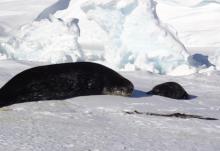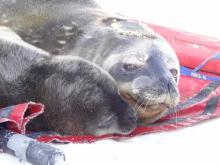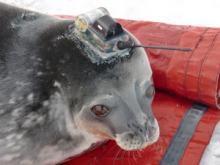Update
Now Archived
PolarConnect Event with Alex Eilers on 13 February 2012 from McMurdo station. You can access the archives for this event by visiting the PolarConnect Archives.
What Are They Doing?
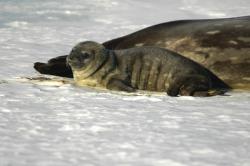
The research team was interested in learning more about Weddell seals by studying how they dive and forage for food during the winter, when days are shorter and there is more sea ice cover. They were also interested in collecting oceanographic data, such as water temperature and salinity.
The research team collected this information by traveling to places where Weddell seals were hauled out on the sea ice, and briefly capturing them. Once they captured a seal, they conducted an exam in order to determine its health and condition. The researchers also put a satellite-linked dive recorder on each seal that they captured. These devices transmit data showing where, how often, and how deep the seals are diving. In addition, the devices record the temperature and salinity of the water where seals are diving.
Currently there is not a lot of information about how Weddell seals find food during the winter. Without this information, it is difficult to predict how seals will respond to changing environmental conditions. By using the seals to collect ocean data, the team has collected important information which is used to develop models to predict the role of the Southern Ocean in global climate processes.
Where Are They?
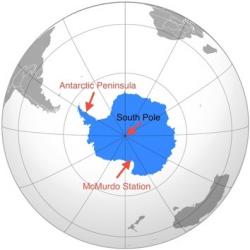
Latest Journals

Dr. Jennifer Burns' research focuses on understanding how the age and physiological status of juvenile marine mammals influences their diving and foraging capacities, and on how differences in rates of physiological development impact life history traits. Burns currently has an active research program focused on understanding whether the rate and extent of neonatal physiological development is closely correlated with the onset of independent foraging. In her research, Burns uses a wide variety of analytical tools including computerized dive recorders, satellite telemetry and GIS techniques, as well as several more hands-on techniques such as measuring heart rate and respiration patterns, energy use, and animal condition and health status.
Daniel Costas is a professor of Ecology and Evolutionary Biology at the University of California Santa Cruz. His research focuses on the adaptations of marine mammals and seabirds to life in the marine environment, by studying their diving, foraging, and searching behaviors. Please read more about Dr. Costas research on the Costa Lab website.
Eileen Hofmann is a professor of Oceanography at the Center for Coastal Physical Oceanography within Old Dominican University. Dr. Hofmann has a wide variety of research interests ranging from describing physical oceanography to mathematical modeling of marine ecosystems.

